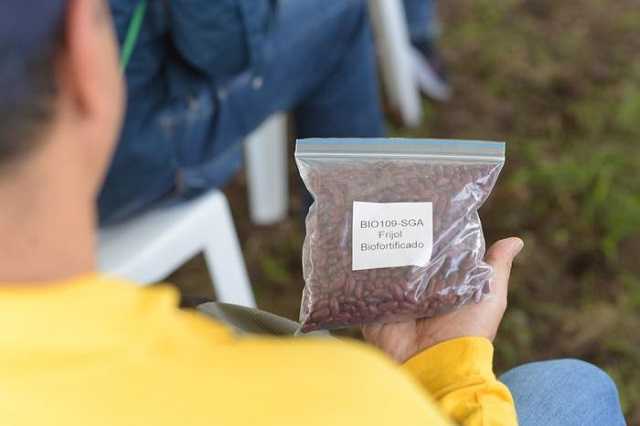CHINCHINÁ, Caldas, Colombia – Three new bush bean varieties with high iron and zinc content, tolerance to drought, pests and diseases, and higher yield potential than traditional beans were recently released at the Cenicafé-FNC Naranjal Experimental Station in Chinchiná, Caldas.
This release is the result of years of collaborative research and interinstitutional efforts among the National Coffee Research Centre (Cenicafé) of the National Coffee Growers Association (FNC), the Alliance of Bioversity International and the International Center for Tropical Agriculture (CIAT), and Semillas Guerrero y Asociados S.A.
BIO103-SGA, BIO105-SGA, and BIO109-SGA are the names of the new materials, characterized by their bushy growth habit, which enables intercropping with coffee. These cultivars can achieve impressive yields of up to 2 tons per hectare, surpassing the national average. Additionally, they exhibit high tolerance to the main diseases and pests, contributing to increased profitability.
These beans distinguish themselves with variations in size, shape, and color compared to traditional varieties. Their appeal, however, extends beyond aesthetics, as they boast impressive nutritional value: when incorporated into diets, they can fulfill up to 39% of the daily iron requirement and 41% of the zinc requirement, offering Colombians up to 1.5 times more minerals than conventional beans.
“Our objective is to foster the development of nutritionally rich and environmentally sustainable food options to enhance their production, distribution, and consumption. We are committed to ensuring that farming families gain wider access to these innovative technologies, with a strong emphasis on bolstering their food security and promoting income generation within the framework of sustainable agriculture,” expressed Carolina González, Lead Scientist of the Biofortified Crops Program at the Alliance of Bioversity and CIAT.
Biofortified beans for better nutrition
Iron and zinc are two crucial micronutrients essential for pregnant women and early childhood: the human body needs iron to produce oxygen-carrying proteins, while zinc is found in cells throughout the body, supporting the immune system’s defense against harmful bacteria and viruses. Furthermore, it contributes to the healthy development of infants.
This is why nutrition statistics in Colombia are a cause for concern. According to data from the Ministry of Health, one in four pregnant women aged 13 to 49 suffer from anemia, with 50% experiencing iron deficiency. Additionally, one in four children between 6 months and 5 years of age have low iron levels, and 34% of children in indigenous and Afro-descendant populations suffer from anemia. Moreover, 36% of children aged between 1 and 4 years lack sufficient zinc.
For this reason, it is imperative to make advanced, climate-resilient crops with high micronutrient content accessible to the population. Research centers, such as the Alliance of Bioversity and CIAT, are actively engaged in developing plant materials or seeds with unique traits related to climate change resilience and nutrition. Their efforts focus on conventional, non-transgenic plant breeding methods.
Field evaluations
After an extensive crossbreeding process, the three new bean varieties underwent evaluation in experimental fields at the Cenicafé-FNC Naranjal (Caldas), La Catalina (Risaralda), El Rosario (Antioquia), and El Tambo (Cauca) stations, from 2021 to 2023. This evaluation confirmed their potential for productivity, adaptability to intercropping with coffee, and their nutritional quality.
These bean varieties offer a nutritional alternative for the 548,581 coffee-growing families in Colombia who cultivate them across 23 departments, covering an area of approximately 842,000 hectares.
“These new varieties represent an excellent alternative to enhance the traditional nutrition of coffee-growing families. Moreover, their high yield potential and adaptability to the specific conditions of coffee-growing areas make them an additional source of income for coffee growers before their first coffee harvest,” said Álvaro Gaitán, Scientific Director at Cenicafé-FNC.


















